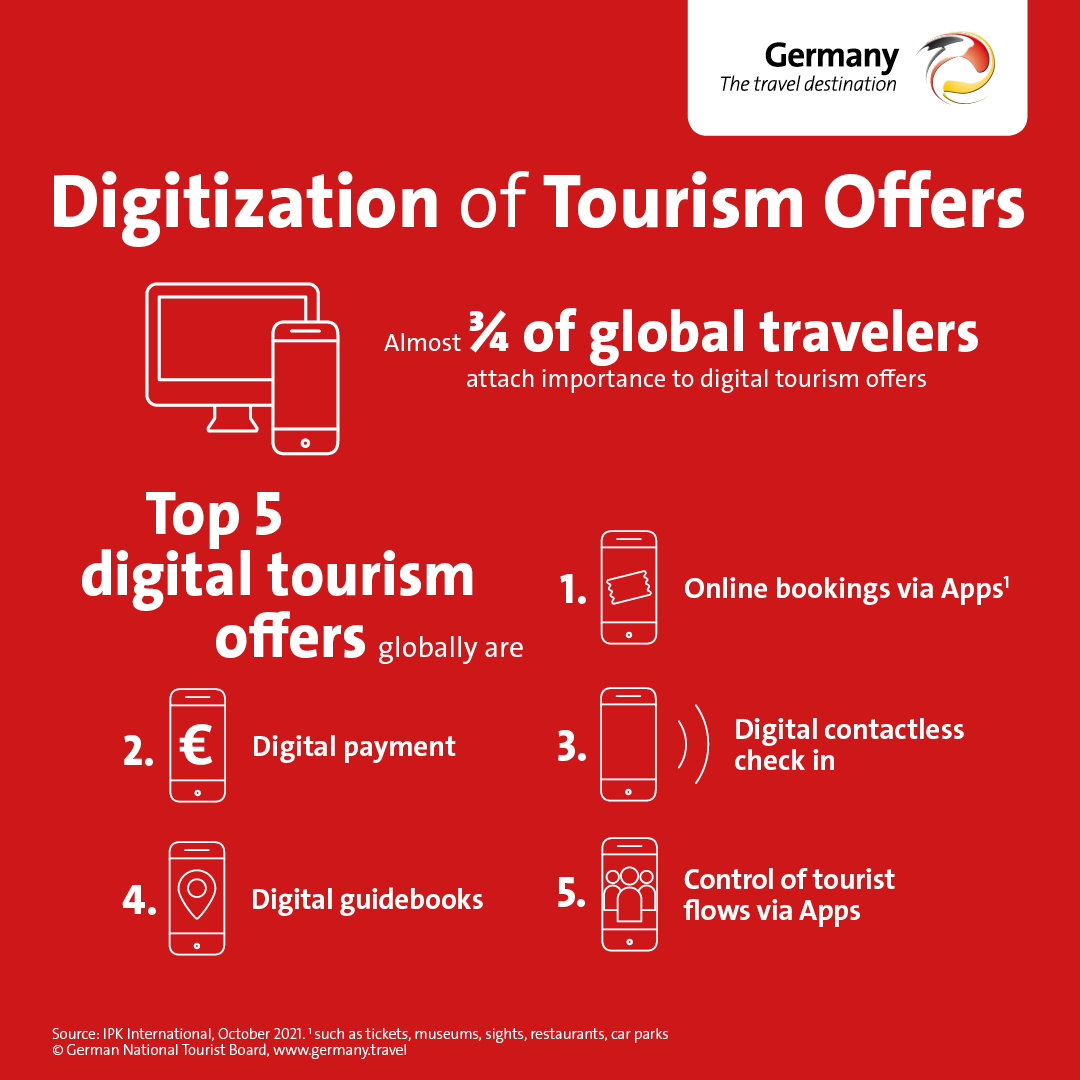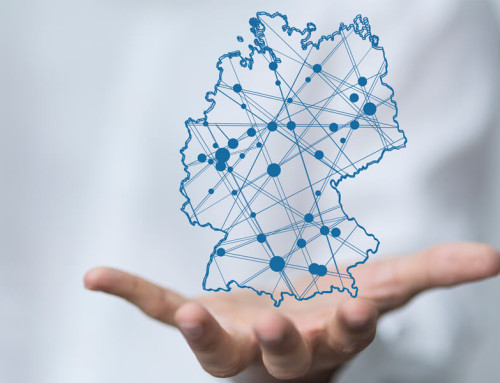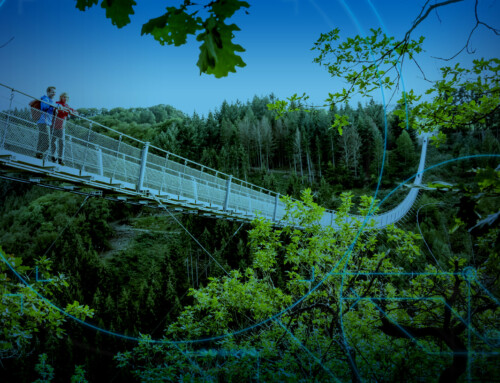In 2022, the digital transformation in German tourism will reach a new dimension. With the opening of the Knowledge Graph for free data retrieval, the largest digital infrastructure project of the German tourism industry becomes reality. The progress of the overall project is impressive evidence of the tourism industry’s strong shoulder to shoulder – especially in the Corona crisis years of 2020 and 2021. At the same time, the cross-company and cross-industry collection and semantic labeling of decentralized data inventories in a knowledge graph is considered an exemplary nationwide data infrastructure project in the German economy.
In order to classify the significance of this milestone and to make the future challenges posed by an open data structure understandable, this article will provide a concise overview of the background, the genesis of the project, its drivers and the upcoming next steps.
Political framework
As early as 2017, the German government’s coalition agreement stipulated the expanded provision of publicly funded data in a 2nd Open Data Act, which was summarized in the German government’s Open Data Strategy of January 2021. The Coalition Agreement-2021-25 goes one step further and aims at a legal entitlement to Open Data. In concrete terms, this means that information obtained from the fulfillment of public-law tasks, for example by DMOs, must be retrievable free of charge and in a machine-readable form.
Already in 2018, the GNTB discussed the conceptual approaches for a common data standard in the DACH-KG, a joint working group of tourism organizations and research institutions from Germany, Austria and South Tyrol, and developed the base for a common knowledge graph.
Customers demand service, topicality and comprehensive information
According to research conducted by IPK International on behalf of the GNTB, three quarters of all travelers worldwide considered digital offerings in tourism to be important in 2021. For 56 percent, the top reason is the possibility of online bookings, such as the convenient purchase of tickets for museums, restaurant reservations or parking spaces via apps using smartphones. 44 percent want to pay digitally at checkout, 40 percent want to check in with low contact, and 36 percent would forgo printed travel guides in favor of e-books or apps.
However, all this only works if all the relevant information – i.e., data – is currently available and can be accessed and read by the service providers.
Accordingly, a central audit of the current status of data types, content types, and technical systems used was initially on the agenda in 2019 as an important milestone in the project Open Data Germany. The analysis of the results showed a markedly heterogeneous data landscape among the stakeholders. At the same time, it provided those with a very good overview of where they stand and how other partners can smoothly engage in the process.
In November 2019, the project Open Data Germany received a further boost with the launch of the knowledge platform www.open-data-germany.org. Since then, it has been open to all potential partners and offers support on numerous issues related to Open Data.
Network partners
This also outlines the framework for the architecture of the Knowledge Graph: As many market participants as possible – from the well-known tourist hotspots in the metropolises to the countless points of interest in rural regions – must be won over to help shape the world of open data.
In 2020, the compact handbook “Open Data im Deutschlandtourismus” (Open Data in German Tourism) showed how the numerous companies in the predominantly medium-sized tourism industry can successfully position themselves between the digitally networked guest and the digital destination, with experts explaining the theoretical connections and practical application examples of a networked digital structure in tourism.
(February 2022)
In addition to providing information on various channels, the GNTB permanently sought personal contact with stakeholders in German tourism to answer questions and reduce retentions. More than 100 presentations and events on the topics of digitization and open data, as well as consultations with hundreds of stakeholders in German tourism, created the basis for broad acceptance of the project throughout the country.
In 2021, the import of selected content data types from federal state marketing organizations and Magic Cities made the first use cases available. In the “Milestone 1” project phase, the POI, Tours & Events domains were prepared, initial test data imported and demo queries performed by Q2 2021. The “Milestone 2” in Q4 2021 enabled the preparation of further five domains, the completion of basic functionalities and the implementation of first test applications.
Competition at European level sets the pace
Both in the DACH region and in the European competition, for example in France with the DATAtourisme project, intensive work has already been done in recent years on the development and implementation of overarching data standards.
The establishment of the Open Data Tourism Alliance (ODTA) 2021 turns the German tourism industry’s project Open Data Germany into a true pan-European project. In the successor organization of the DACH-KG, National Tourist Boards and regional tourism organizations from Germany, Austria, Switzerland, Italy and Sweden exchange information in order to promote the standardization of semantic data models for tourism information on the basis of the schema.org standard and thus the digitization in European tourism across countries. ODTA is structured in such a way that additional market participants can join at any time.
Perspectives
By the end of Q2 2022, the project will enter the home stretch with “Milestone 3“. With the data integration then in place, all LMOs and Magic Cities will be connected to the Knowledge Graph. In detail, ten domains can be imported: POIs, Tours, Events, Accommodations, Stories, Gastronomy, Cities, Offers, Local Businesses, Persons. With the go-live, free data retrieval of the Open Data datasets integrated in the Knowledge Graph will be possible with CC0, CC BY and CC BY-SA licensing.
However, “going live” in June 2023 does not mark the end of the Open Data/Knowledge Graph project. It remains an ongoing day-to-day task for all involved. Thus, in the processes of the partners, the maintenance of the databases will take on an increasingly important role, which can only be ensured through financial support and qualification of the employees involved through training and education.
Only in this way can we jointly secure the future positioning of Destination Germany in the competition among destinations.
Asger Schubert
madkomPR
Asger Schubert arbeitet seit mehr als 20 Jahren als PR-Berater und PR-Redakteur für Unternehmen und Organisationen in der Tourismusindustrie, im Luftverkehr, Standortmarketing sowie in der Technologie- und Dienstleistungsbranche. Nach Führungspositionen in mehreren großen Agenturen – unter anderem zehn Mal Touristik-PR-Agentur des Jahres – gründete er 2013 madkomPR.














